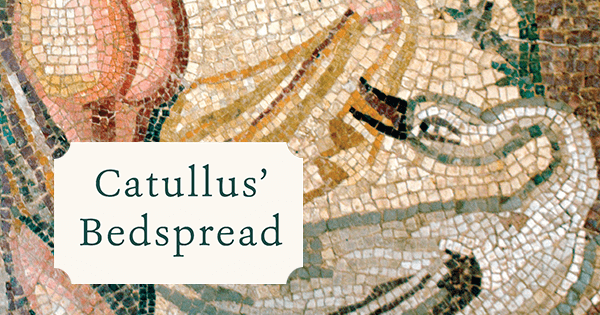Catullus’ Bedspread
Read an excerpt from Daisy Dunn’s new biography of Rome’s most erotic poet

Passionate, obsessive, lurid, breathless: adjectives likelier to be associated with romance novels than Rome. But as Daisy Dunn writes in Catullus’ Bedspread, these words perfectly describe the life of Gaius Valerius Catullus, whose love verses influenced the likes of Ovid and Virgil in the first century B.C. Like Shakespeare at his raunchiest—and most sentimental—Catullus invented new words in his native tongue and mixed the profane and the profound with aplomb.
As Dunn writes in the prologue, Catullus’s anthology of roughly 100 poems is the earliest surviving book of its kind in Latin—and thus paints a “rare and highly personal portrait of a life during one of the most critical moments in world history”: the dying days of the Roman Republic. Read an excerpt from Dunn’s book and get a taste of Catullus’s inimitable voice.
Perhaps it is because our ideas about ancient poetry are so coloured by the awe-inspiring epics of Homer and their lofty themes of humanity that many of Catullus’ poems seem so surprising and immediate. While some of his poems are highly learned and erudite, others are mischievous, goatish, direct. With characteristic boldness, he requests a woman he loves to:
Give me a thousand kisses, then a hundred
Then another thousand, then a second hundred.
Then – don’t stop – another thousand, then a hundred …In Latin these lines begin so abruptly—da, dein, deinde—it is as if we hear them with Catullus’ quickening heartbeat. I was seventeen when I first discovered them, and they made Catullus feel more alive to me than any other poet I knew. I have read them hundreds of times since, and they still have the same effect.
One of the reasons Catullus’ poems are still so readable I think is that they show that the people of his world were not always so very different from us. The characters he encounters and describes in the streets and bawdy inns of Italy call to mind the stock cast of a Roman comedy—or even a scene in late-night Soho—teeming with heartbroken lovers, drunken cavorting youths, old men pining for women a fraction of their age, money-grabbing brothel-keepers, mercenary meretrices (prostitutes), slaves who know too much.
Catullus’ immense skill as a poet lay in his ability to combine many literary genres in the Latin tongue, not just elements of comedy, but the clarity of Sappho, the celebrated female poet, the compact and erudite style of Hellenistic poets, and the wit of lewd graffiti in Rome, with themes as various as love, the writer’s life, and the myth of Jason and the Argonauts. The Roman province of Macedonia incorporated much of mainland Greece, and in Catullus’ day Greek culture had well and truly permeated Rome’s own.
From the book Catullus’ Bedspread by Daisy Dunn. Copyright ©2016 by Daisy Dunn. Reprinted courtesy of Harper, an imprint of HarperCollins Publishers.

